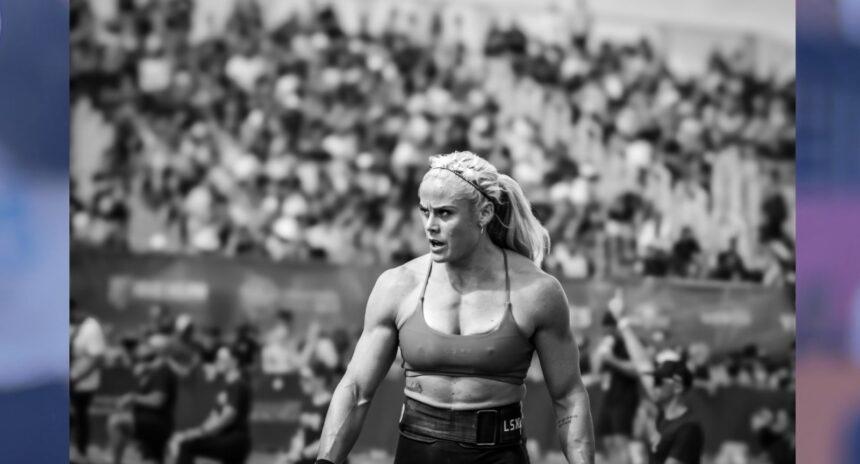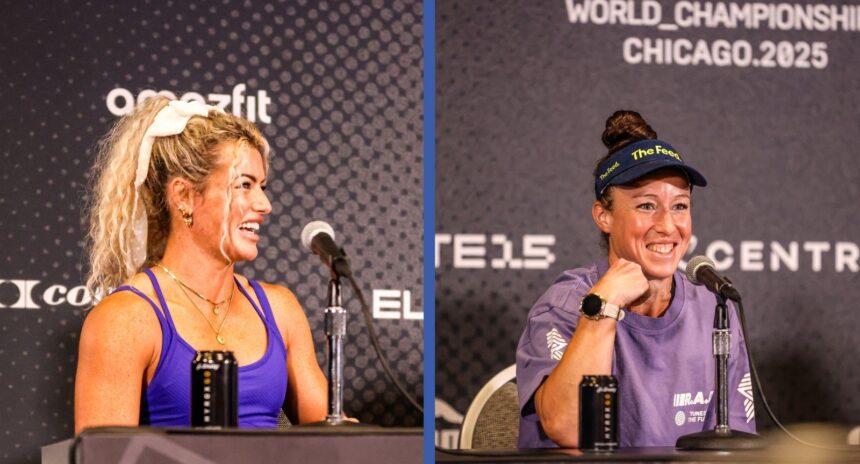Will Moorad: Older, Wiser, and Full of Fire

CrossFit athletes have had some extraordinary accomplishments this year, one of the biggest being the qualification for the CrossFit Games for the 10th year by Noah Ohlson, Cole Sager, and BKG.
Celebrating the consistency these three men have demonstrated in this sport is a fantastic feat. But there is another guy who has been around for ten years, competing on the Regionals stage for the first time in 2013–Will Moorad.
Moorad too, is one of the OG CrossFitters who has been around to witness the sport’s exponential growth. While some of these athletes have had straightforward upward and consistent journeys, Moorad has had to weather many more ups and downs.
On the heels of qualifying for his fifth CrossFit Games out of the competitive North America East Semifinal, Moorad heads to Madison, cool, calm, and collected, ready to draw on his experience and the lessons he has learned in the past few years.
Moorad’s first big hurdle came knocking on his door at 2017’s Wodapalooza. He had finished in the top eleven in the four Regionals before this competition and even finished 14th at the Games in 2014, so Moorad was ready to return.
- Moorad: “I had a pretty bad reaction to one of the workouts, got really sick, and just was throwing up and stuff. And I have never thrown up from a workout. I’ve been an athlete my entire life and know how to push hard, obviously, but never thrown up, which is a weird thing. But you know, there is a first time for everything.”
Moorad went back to the hotel hoping to sleep it off, but after a rough night with back pain and intense nausea the following day, his wife, Cass, an ICU nurse, got him together, and they went to the local hospital. As many people in the community know, Moorad was in the middle of complete kidney failure at the time. They treated and monitored him in the hospital and even took a biopsy to learn more.
- “The biopsy suggested that I might have this thing called IgA Nephropathy, which is the most well-known, most common kidney disease in the world. But it’s a little bit unknown how aggressive it can be; it can be super aggressive, or it can be just moderate. That news caused me to decide to step away from the game. Training at this degree is not a healthy thing with this, so I made the objective decision to say that’s probably not smart. Like, don’t touch the stove if it burns you.”
Even though it was hard to step away in his soul and heart, one of Moorad’s incredible skills quickly surfaced, his ability to separate himself emotionally and make an informed decision.
- “Being able to separate myself from the emotions, which sometimes emotions can be irrational and lead to more bad decisions. Obviously, it sucked. But up to that point, I’ve made the world championships. I played high-level sports my whole life. That’s pretty good and 99% of people can’t say that.”
This was when one of Moorad’s first significant life pivots happened.
He took a non-athletic job and went on with his daily life, managing his disease. He still trained—you can’t take the athlete out of the man, but he ensured he was never overreaching.
He had been keeping up with his doctor, doing requisite blood tests to track his health, and almost two years later, his kidney function had improved drastically. His almost perfect kidney function caused the doctor to tell him he didn’t need to come in anymore to track his health. He told his wife the good news immediately, and his next call was to his coach Max to suggest they run it back and make another go at the Games. Max was in, and Moorad eased back in successfully, qualifying again for the Games in 2019.
Many people might look back with frustration that a misdiagnosis robbed them of almost two years of competing at a high level. Not Moorad.
- “I wouldn’t change it. I think my journey has been one where I can share how I’ve dealt with the fear of failure and come back; I made it back to the top of the mountain and dealt with crazy unfortunate ups and downs of life and have still been able to do my job at the highest level. And I think that’s something that could give people some motivation. I’m not saying I’ve had the hardest road or anything, but I’ve had a much less-than-ideal one.”
- “I think that’s where I can help people or what my story is. It’s made me a much more mature man. There are opportunities when you have adversity. And not everybody’s meant to fly, some people are meant to sink, and I’m just glad that I could somehow figure out how to deal with and cope with everything.”
But the challenges weren’t done for him.
Just after the 2021 CrossFit Games, Moorad’s wife, his high school sweetheart Cass was diagnosed with breast cancer. Cass was extremely fortunate, but it didn’t make the road any less hard for both of them.
- “They did all the tests, and then we went in and met with the oncologist, and they give it to you straight. Thankfully they gave us some decent news. After the diagnosis, they said it was very treatable, so we devised our game plan. This is how we’re doing it, and we have to go in and start it now.”
Cass is just as tough as Will, and she refused to let him give up his 2022 season. The two figured out how Moorad could best support his wife through the journey and sprinkled in with support from family and friends, the village came through to help Cass on her journey. The perspective bled into Moorad’s training.
- “It gives you real perspective. If Cass just had a bunch of chemo, her whole body hurts, and she’s nauseous, you can go push it on the rower for an hour to accomplish your goals. It was healthy motivation for me.”
It made Moorad think more about the core of his motivation, and he came up with a surprising answer.
- “It’s interesting how trauma can fuel a drive for high-level athletes or high achievers. It’s like jet fuel or like gasoline on a fire. And I’ve dealt with a lot of trauma as a high-level athlete – my dad died when I was relatively young, in my early 20s, while I was like pursuing pro soccer. I had the kidney issue, and then there was a whole comeback fueled there, and Cass’s diagnosis and treatment, and now her recovery.”
- “You can direct that energy or that strong sadness and emotion into a positive light. Not only from a perspective gaming process where you can just have more empathy and sympathy and just relate more to people but also it can push you. I’ve tried to use it to push me to dig deeper, find greater heights with that emotion in you.”
- “But that burns really hot. And you must learn how to let that energy go – when to turn on the afterburners and when not to because I can always do that. And it just won’t last, right? It’s all about pacing. To produce your best performance in life, sport, work, or whatever you do. I think I did a good job of letting it fuel me as much as possible in my life.”
Moorad acknowledges that the ability to compartmentalize is essential.
- “I’ve spent a lot of time having to dig through my emotions. And I have always thought, you can either learn from this, or you can either let this defeat you. You can sit with it or use it as a place to grow and elevate yourself. I think it’s just important to share how you coped. I think to make a big impact on the world, beyond sport, you have to be able to relate with people on those intimate levels – and sickness, dealing with passing, dealing with self-hardship, around health or losing your job, or whatever it is.”
- “I think if you can help people during those times, they’ll remember you as a good dude. And that is more important to me than being a great athlete who has gone to the Games many times. That’s where my heart is. Obviously, in my heart, I’m also an elite savage on the floor, but it’s almost like you have to wear two hats, like different people.”
It’s something Moorad would like to do when his competitive years are behind him; train elite athletes and really focus on their mental game. But don’t get too excited; he doesn’t think it will be that soon. Moorad is loving training right now – he has a fantastic time training at CrossFit East Nashville with the PRVN crew, and his voice lights up whenever he talks about anyone over there.
- “It’s good to learn from each other; you pull stuff from each other. Because everybody’s navigating a similar journey. But we all have different ways of doing it – different perspectives. It’s been really fun to have other pros around to just learn from and train with and share the struggle and the triumphs and failures. It’s just nice to have that camaraderie from your peers daily.”
- “I’m definitely going to keep going. I’m competing next year. And then I’m interested if there’s a right opportunity to coach pros in the space when I’m done. It’s just something I’ve lived and breathed for so long.”
But competing is not an old hat for this seasoned vet. He still gets excited to compete, and the high never disappears.
- Moorad: “It gives me goosebumps just thinking about competing in the Coliseum right now. It’s like a little kid in a candy store. It’s your dreams, and you get to live them out.”
With a healthy Cass and an amazing group of training partners around him ready to support him as he readies himself for his fifth CrossFit Games, Moorad knows to appreciate it more now than ever.
- “You’ve heard about many athletes soaking up all this stuff. And that’s real because you want to hold on to those moments. After all, you never know when it’s going to be the last time. Sport is vicious, and it’s fickle. And if you have one bad injury, your career could be over. So, if you can’t do something because of a physical ailment, that sucks. However, you can still hold on to the mental experience or, beyond that, use your mental experience to prolong your career and a different avenue, not as an athlete, but maybe as a coach.”
“I appreciate every time I run out on the floor and give my absolute best in every event when I run out; the floor is hallowed ground. And you need to be aware of that and not just let it pass as a fleeting moment.”


